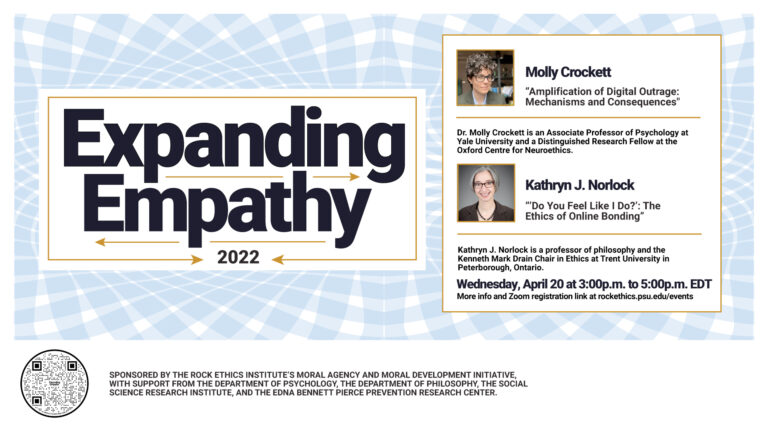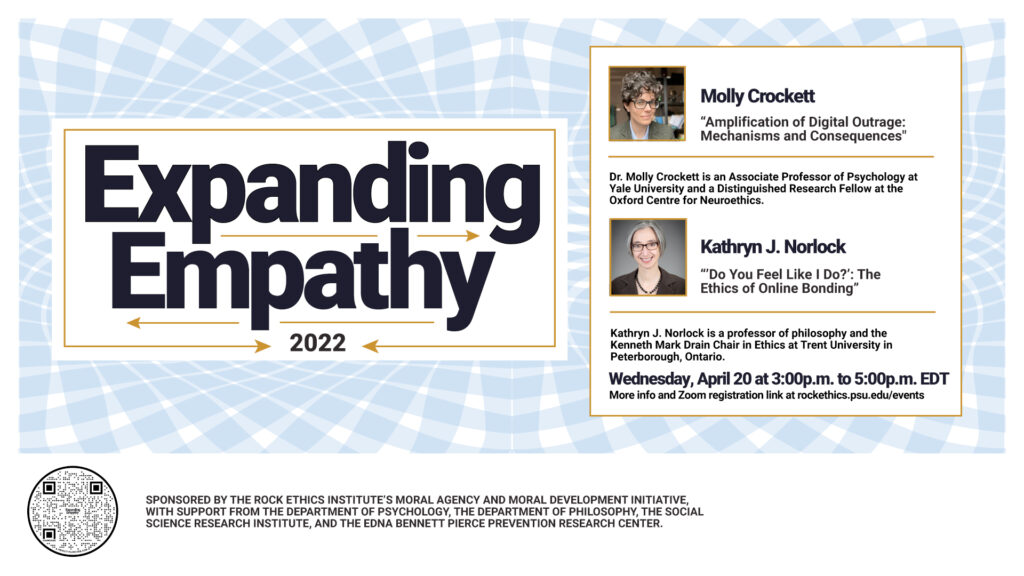"Amplification of Digital Outrage: Mechanisms and Consequences" by Molly Crockett
Abstract: Moral outrage shapes fundamental aspects of social life and is now widespread in online social networks. How does social media change the expression of moral outrage and its social consequences? This talk will develop a theory that social media platforms amplify moral outrage by exploiting our capacity to learn from social rewards. Data from observational studies of millions of social media posts and behavioral experiments confirm that social rewards amplify moral outrage at the level of individual users. I’ll then present evidence for several troubling consequences of amplified digital outrage: it facilitates the spread of misinformation, exacerbates hate speech and networked harassment, and inflates collective beliefs about intergroup hostility. I’ll conclude with a discussion of the ethical and policy implications of these findings.
Dr. Molly Crockett is an Associate Professor of Psychology at Yale University and a Distinguished Research Fellow at the Oxford Centre for Neuroethics. Prior to joining Yale, Crockett was an Associate Professor of Experimental Psychology at the University of Oxford. In July 2022, Crockett will be joining Princeton’s Department of Psychology and University Center for Human Values. Dr. Crockett holds a BSc in Psychobiology from UCLA and a PhD in Experimental Psychology from the University of Cambridge, and completed a Wellcome Trust Postdoctoral Fellowship with economists and neuroscientists at the University of Zürich and University College London. The Crockett Lab investigates the cognitive science of human morality, integrating theory and methods from philosophy and social science.
and
"“Do You Feel Like I Do?”: The Ethics of Online Bonding" by Kathryn Norlock
Abstract: A main purpose of much online complaining and outrage is relational bonding. After all, we could each be outraged or unhappy all by ourselves. The reason to share emotional responses online is to have company or receive affirmation, which is why many of us relied on social media to complain or share outrage during the pandemic. So this presentation does not recommend against being online. But the outcomes of so much online bonding include real moral risks of effects including personal transformations in our core concepts of the world that one cannot foresee or consent to in advance. Molly Crockett identifies effects including distorted views of collective emotions as a result of sharing in online outrage. I explore the ethical ramifications of adopting distorted views of collective emotions, to show that the aims of those who hold them are not holding ethically bad intentions (that is, to form relational bonds), but that aims are not sufficient to justify behaviors with harmful outcomes. Holding a distorted view of collective emotions is not a decision for which one can be blamed, when such personal transformations are unforeseeable, but the consequences can be epistemically and ethically damaging.
Kathryn J. Norlock is a professor of philosophy and the Kenneth Mark Drain Chair in Ethics at Trent University in Peterborough, Ontario. She is the author of Forgiveness from a Feminist Perspective and a co-founder and co-editor of Feminist Philosophy Quarterly.
Register for webinar (free) here:
https://psu.zoom.us/webinar/register/WN_abJlh0zURI6x77JO6eE46g


Occurrences
-
Wednesday, April 20, 2022, 3:00 p.m.–5:00 p.m.